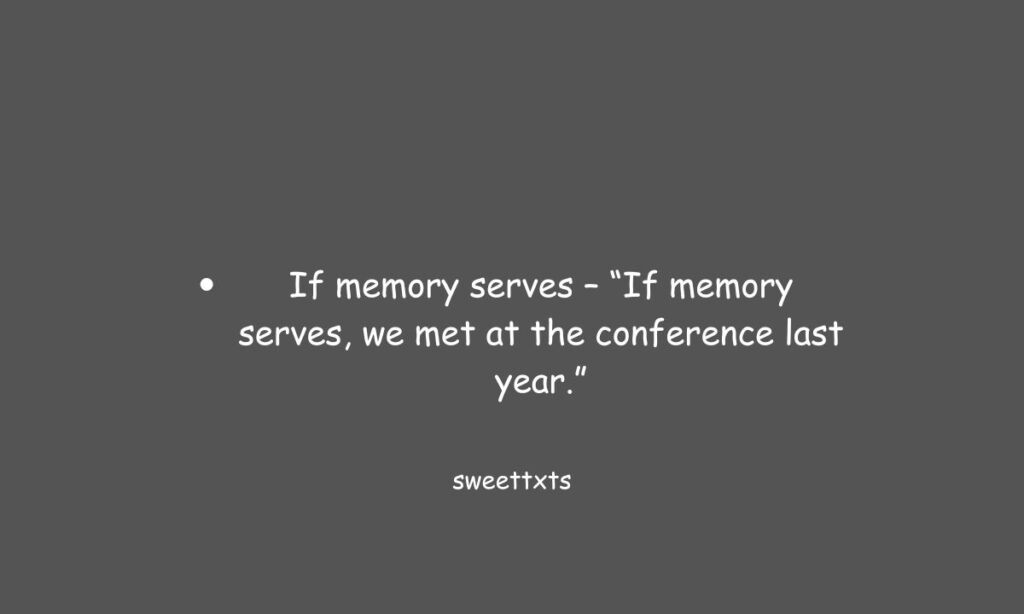In the fast-paced world of digital communication, acronyms like “iirc” often surface in text conversations. Understanding their meanings helps prevent miscommunication and promotes clarity. “iirc” is one such term that many encounter but may not fully understand.
While acronyms are useful for brevity, they can sometimes cause confusion, especially when the recipient is unfamiliar with internet shorthand. This article explores the meaning of “iirc,” its origin, usage, and alternatives that vary in tone and context—from casual to professional.
In addition, we’ll touch on the meaning of “hiatus,” particularly as it relates to the concept of a pause or break in communication. Together, these insights offer a more nuanced view of how language adapts in online and real-world settings.
What Does “iirc” Mean?
“iirc” stands for “if I recall correctly”. It’s widely used in digital conversations—especially on forums, text messages, social media platforms, and emails. The phrase is used when someone is trying to express information based on memory, without making a definitive claim.
This abbreviation helps soften a statement, implying the speaker is not fully certain. For example, someone might write, “iirc, the meeting was rescheduled to next Friday,” meaning they think this is true, but they’re not 100% sure.
Although it’s informal, “iirc” is widely accepted in many casual and semi-professional settings. However, there are times when more polished or clearer expressions are preferred—especially in business, academic, or formal contexts.
iirc Meaning in Text
In the context of texting and digital platforms, “iirc” plays a key role in expressing uncertainty with confidence. It acts as a verbal cushion, allowing users to present information without claiming absolute accuracy.
Consider the sentence:
“iirc, she moved to Boston last year.”
This lets the speaker contribute to the conversation while still leaving room for correction. It’s efficient and widely understood among those familiar with internet slang, but it may come across as too informal in some professional settings.
To ensure effective communication, especially in diverse or mixed-audience environments, it’s useful to consider alternatives that maintain clarity while adjusting tone and formality.
Origin and Contextual Use of “iirc”

“iirc” emerged from early internet culture, particularly during the rise of IRC (Internet Relay Chat) and message boards in the 1990s and early 2000s. Users needed to type quickly and clearly, which led to the widespread adoption of abbreviations like “lol,” “brb,” and “iirc.”
Over time, the use of “iirc” expanded to emails, text messages, Twitter, Reddit, and other social platforms. Its popularity continues today because of its usefulness in suggesting recollection while acknowledging potential error.
Understanding this acronym in its original and modern contexts helps you decide when and where to use it appropriately—or when it’s better to opt for a different phrase altogether.
When to Use “iirc” (and When Not To)
“iirc” is best used when speaking informally with friends, colleagues, or online groups who are familiar with internet lingo. It works well when you want to contribute a detail or piece of information while signaling you’re not absolutely sure.
However, it may not be suitable for formal writing, academic essays, business memos, or professional reports. In such situations, a more spelled-out version or a synonym that better fits the tone may be appropriate.
For example, saying “To the best of my knowledge…” in a workplace setting is more professional than “iirc.” Knowing when to use and avoid “iirc” demonstrates linguistic adaptability.
Alternatives to “iirc” Based on Context and Tone

Let’s explore 15 clear and appropriate alternatives to “iirc,” divided into casual, polite, and professional tones. These expressions can enhance your communication, ensuring that your message aligns with the situation and audience.
Casual Alternatives
- I think – “I think the game starts at 7.”
- Pretty sure – “I’m pretty sure she’s on vacation this week.”
- Not 100% but I believe – “Not 100% but I believe it was his idea.”
- If memory serves – “If memory serves, we met at the conference last year.”
- As far as I can remember – “As far as I can remember, that store closed last winter.”
These expressions are friendly, relaxed, and ideal for conversations with friends or on casual platforms like group chats or social media.
Polite Alternatives
- To the best of my recollection – “To the best of my recollection, we submitted that file in May.”
- If I’m not mistaken – “If I’m not mistaken, she handled the budget last quarter.”
- From what I remember – “From what I remember, they used to meet on Mondays.”
- If I remember rightly – “If I remember rightly, they were considering that design.”
- Unless I’m mistaken – “Unless I’m mistaken, this route takes longer.”
These phrases are useful in polite interactions—like speaking to clients, teachers, or new acquaintances—where you want to sound respectful yet still uncertain.
Professional Alternatives
- To the best of my knowledge – “To the best of my knowledge, the project is on schedule.”
- Based on my understanding – “Based on my understanding, the policy changed last year.”
- My understanding is that… – “My understanding is that this version has been approved.”
- It’s my recollection that… – “It’s my recollection that we agreed to those terms.”
- As I recall – “As I recall, we addressed this issue in last month’s report.”
These alternatives are suited for business meetings, reports, presentations, and academic writing. They help maintain professionalism while still signaling limited certainty.
Nuances of Tone: Why It Matters
Tone is key in communication. A casual tone with close friends or on social media is entirely different from what’s expected in a job interview or professional email. Using “iirc” in the wrong context can come across as careless or even unprofessional.
When writing to a supervisor or presenting in a formal setting, clarity and appropriateness in language choice matter. Phrases like “to the best of my knowledge” or “based on my understanding” retain a sense of modesty while sounding credible.
By contrast, informal chats allow more flexibility. Saying “pretty sure” or “I think” keeps things light and conversational without the risk of seeming too unsure or uninformed.
What Does “Hiatus” Mean?

The word “hiatus” refers to a pause, break, or interruption in a sequence, process, or activity. It’s often used in academic, entertainment, and workplace settings. For example, when a TV series goes off the air between seasons, it is said to be “on hiatus.”
Similarly, if someone takes a break from social media or work for personal reasons, they might describe it as “taking a hiatus.” The term implies that the interruption is temporary and that regular activity is expected to resume later.
In digital conversations, you might see someone say:
“I’ve been on a bit of a hiatus from posting.”
This adds depth to the phrase and helps convey a break without explaining every detail.
Using “Hiatus” in Conversations
“Hiatus” is versatile. It can be used in both formal and informal contexts, though it leans slightly toward the formal side. Here are some usage examples to demonstrate its flexibility:
- Formal: “The research team is on hiatus pending funding approval.”
- Semi-formal: “She’s on a brief hiatus from her podcast to focus on writing.”
- Informal: “I took a short hiatus from Instagram. Needed a break.”
Pairing “hiatus” with appropriate expressions like “brief,” “extended,” or “temporary” also helps fine-tune its impact.
Final Thoughts
Understanding the meaning and appropriate use of phrases like “iirc” and “hiatus” helps improve clarity, tone, and professionalism in communication. Whether you’re drafting a message, participating in a discussion, or writing a report, choosing the right words makes a significant difference.
“iirc” is a convenient shorthand for digital platforms, but not always suitable for formal or academic use. Similarly, “hiatus” is a helpful term when discussing breaks or interruptions, especially when you want to convey that the pause is not permanent.

Daily blessings and uplifting messages by Drupmo for every morning, evening, and day of the week—bringing peace, hope, and inspiration to your soul.